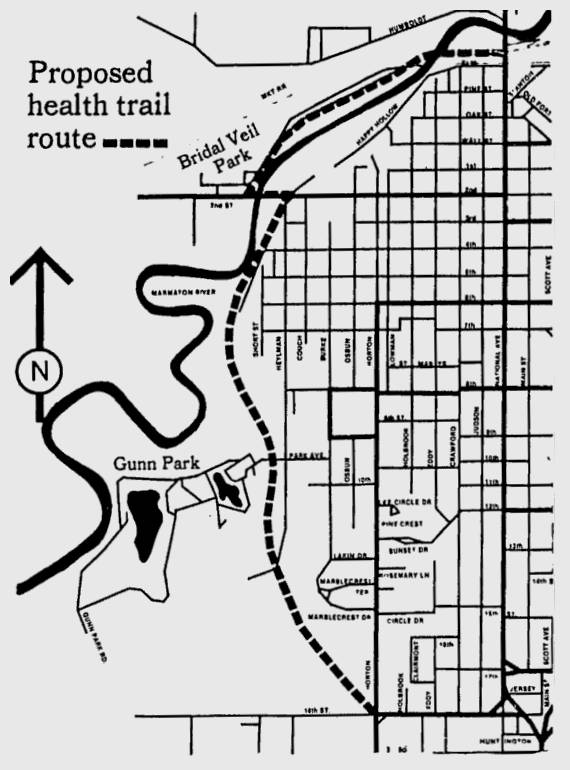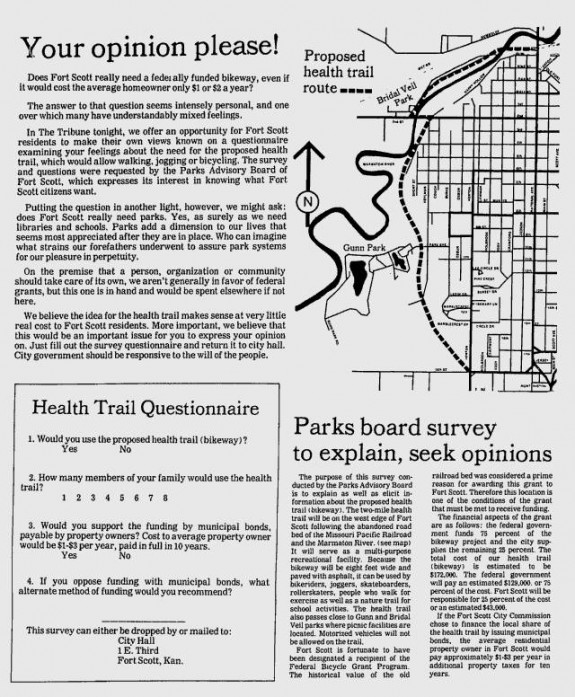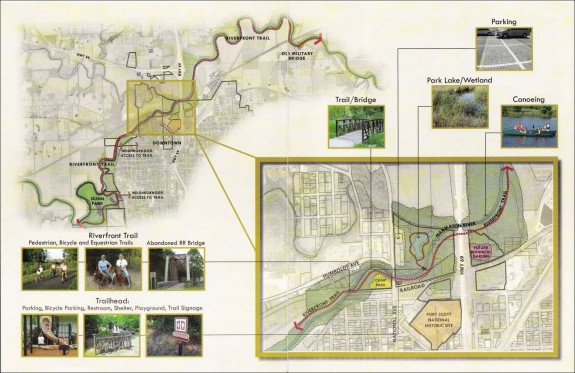In 1981, noting a burgeoning nationwide movement to transform out-of-service rail lines into recreational trails, and with federal funds in place, forward-looking leaders in Fort Scott, Kansas broached the idea of creating a 2.3-mile trail on the former Missouri Pacific right-of-way on the western edge of the city.
Members of the Fort Scott Parks Advisory Board saw an opportunity to utilize federal funds to pay the majority of the costs involved in creating the bikeway, so they decided to conduct a survey to gauge public support:
Members of the board decided Tuesday night to find out if Fort Scott was really interested in having a 2.3-mile long, 8-foot wide strip of asphalt along the west side of town, to be used for bicycling, jogging, walking, skating and relaxing. To do this, they plan to distribute surveys in Fort Scott schools and place an advertisement in the Fort Scott Tribune asking for opinions on the issue.
The city is at the point where the city commission must decide whether to go ahead with the project or not. Don Munsell, city manager, said last night that the next step in the project is to contact the people who now own the land to be used for the bikeway, most of which used to be Missouri Pacific right-of-way, about selling or donating the land for the city. So far, he said, the city has not spent any money on the project. The city has a budget, approved by the state of Kansas and the U.S. Department of Transportation, of $26,000 for land Requisition. In addition, construction was estimated, in 1980, to cost $140,000 to $150,000, Munsell said. Most of this money will be paid by the federal government. The city will pay the remaining 25 percent.
At Friday’s city commission meeting, a number of people, most of whom own land along the right-of-way, said they were opposed to the project. Sharon Shepherd, a member of the park board, asked the commission for time to raise the city’s share of the costs through private donations before it decided to abandon the project.
Here’s the survey that was published in the Fort Scott Tribune:
Here are some details from the survey:
Fort Scott is fortunate to have been designated a recipient of the Federal Bicycle Grant Program. The historical value of the old railroad bed was considered a prime reason for awarding this grant to Fort Scott. Therefore this location is one of the conditions of the grant that must be met to receive funding.
The financial aspects of the grant are as follows: the federal government funds 75 percent of the bikeway project and the city supplies the remaining 25 percent. The total cost of our health trail (bikeway) is estimated to be $172,000. The federal government will pay an estimated $129,000, or 75 percent of the cost. Fort Scott will be responsible for 25 percent of the cost or an estimated $43,000. If the Fort Scott City Commission chose to finance the local share of the health trail by issuing municipal bonds, the average residential property owner in Fort Scott would pay approximately $1-$3 per year in additional property taxes for ten years.
The public response to the survey was wildly divergent, with 123 of 149 respondents to the newspaper survey opposed to the bikeway, but 644 of 832 schoolchildren voting in favor of the bikeway.
The negative response from adults was expected: “I think most of us felt that the Tribune survey would be negative. People who are against things usually get their surveys in early.” However, “We took all the surveys into account. I know children aren’t taxpayers, but they will use it and I think they should be taken into account.”
After receiving the survey results, the Park Board voted 5-to-1 to recommend that the city commission approve the construction of the proposed bikeway, and accept the federal funding.
However, the city commission rejected the Park Board’s advice, and voted against the bikeway project, considering only the adult opinion:
“The tremendous preponderance of negative votes led me to consider that this wasn’t a project that is necessary or desirable.” Hinkley said. Other people told the commission that they opposed the bikeway because it would not be safe, because it would interfere with their property and because it was a wasteful expenditure of public money. Carolyn Sinn, city commissioner, said she had received a tremendous number of phone calls opposing the project. “Because of this,” she said. “I move that we do not continue with the pursuit of asking for funds for the bikeway project.” The motion was passed unanimously, with Commissioner Lewle Sutcliffe absent and Commissioner Ava Webber voting yes with regret.
“Regret”: That’s a word that likely sums the situation up pretty well.
By listening to the naysayers, fear-mongers, and “people who are against things”, and ignoring the overwhelming views of their young people, Fort Scott missed out on their chance to develop one of the state’s first rail-trails.
Here’s a closer look at the proposed route for the Fort Scott Bikeway:

Despite the setback, Fort Scott has made some trails progress over the years. A portion of that right-of-way was ultimately included in Gunn Park, and became part of the excellent Gunn Park Trails mountain biking system. The Riverfront Park Trails opened in July 2014, and in December 2014, Bourbon County sold 23.8 acres of land east of US-169 to Wall Street Properties for “recreational purposes”, which “would possibly include a zip line, walking and biking trails, as well as motorized trails”.
The Fort Scott Bourbon County Riverfront Authority is the organization that is developing the Riverfront Park Trails. Their vision includes trails along the Marmaton River that would connect Riverfront Park to Bridal Veil Park, Gunn Park, and the Old Military Bridge east of town:
So with the Riverfront Authority progressing on its plan, and infrastructure such as the MKT Marmaton River Bridge intact, the spirit of the original Fort Scott Bikeway may yet prevail.
Post tags: Fort Scott, Rail Trail




